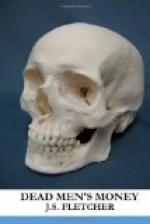“Good notion, Hugh, my lad!” he exclaimed. “True—there might. Here goes, then—we’ll look through them systematically.”
In addition to the half-dozen boxes full of prime Havana cigars, which lay at the top of the chest, there were quite a dozen of similar boxes, emptied of cigars and literally packed full of the curiosities of which Mr. Lindsey had just spoken. He had turned out, and carefully replaced, the contents of three or four of these, when, at the bottom of one, filled with old coins, which, he said, were Mexican and Peruvian, and probably of great interest to collectors, he came across a paper, folded and endorsed in bold letters. And he let out an exclamation as he took this paper out and pointed us to the endorsement.
“Do you see that?” said he. “It’s the man’s will!”
The endorsement was plain enough—My will: James Gilverthwaite. And beneath it was a date, 27-8-1904.
There was a dead silence amongst the four of us—my mother had been with us all the time—as Mr. Lindsey unfolded the paper—a thick, half-sheet of foolscap, and read what was written on it.
“This is the last will and testament of me, James Gilverthwaite, a British subject, born at Liverpool, and formerly of Garston, in Lancashire, England, now residing temporarily at Colon, in the Republic of Panama. I devise and bequeath all my estate and effects, real and personal, which I may be possessed of or entitled to, unto my sister, Sarah Ellen Hanson, the wife of Matthew Hanson, of 37 Preston Street, Garston, Lancashire, England, absolutely, and failing her to any children she may have had by her marriage with Matthew Hanson, in equal shares. And I appoint the said Sarah Ellen Hanson, or in the case of her death, her eldest child, the executor of this my will; and I revoke all former wills. Dated this twenty-seventh day of August, 1904. James Gilverthwaite. Signed by the testator in the presence of us—”
Mr. Lindsey suddenly broke off. And I, looking at him, saw his eyes screw themselves up with sheer wonder at something he saw. Without another word he folded up the paper, put it in his pocket, and turning to Mrs. Hanson, clapped her on the shoulder.
“That’s all right, ma’am!” he said heartily. “That’s a good will, duly signed and attested, and there’ll be no difficulty about getting it admitted to probate; leave it to me, and I’ll see to it, and get it through for you as soon as ever I can. And we must do what’s possible to find out if this brother of yours has left any other property; and meanwhile we’ll just lock everything up again that we’ve taken out of this chest.”
It was close on my dinner hour when we had finished, but Mr. Lindsey, at his going, motioned me out into the street with him. In a quiet corner, he turned to me and pulled the will from his pocket.
“Hugh!” he said. “Do you know who’s one of the witnesses to this will? Aye, who are the two witnesses? Man!—you could have knocked me down with a feather when I saw the names! Look for yourself!”




